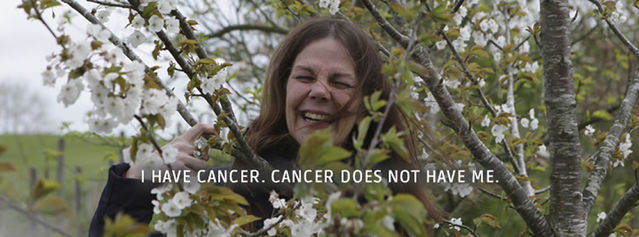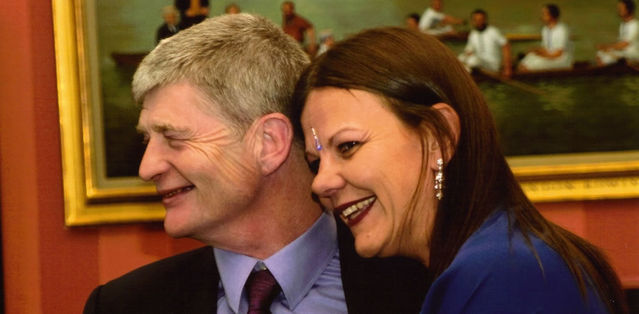By the time I received a full diagnosis, the threat levels were layered on top of each other like a wedding cake. My ability to breathe was being increasingly compromised by the large primary tumor in my lung, along with other lesions in that area; I was in danger of full paralysis because a tumor on my C3 vertebra, at the midpoint of my neck, was eating through the bone and beginning to press on my spinal column; and my presence of mind was being threatened by innumerable metastases in the tissue and lining of my brain. This felt greater than the threat to my existence, inciting a desperate urgency to act before the lucidity I had worked so hard for over many years in the personal growth arena melted like snow.
I was forty-eight years old. It was winter. Cancer had already carried off the vision in my left eye and my power to craft coherent sentences. Words kept swapping places with each other like clouds just before they break to give rain. I was being breached and squeezed out.
Eventually, having navigated my way through a minefield of largely dis-empowering advice about how to stay alive, I was offered a temporary reprieve in the form of a tumor-inhibiting chemo drug. My relief was immense, especially having taken a significant risk by refusing whole-brain radiation, after which many patients say they are never the same again. It didn’t last. Within a few days the drug had destroyed the mucous membranes in my mouth and throat, rendering me unable to swallow while blistering my face so badly I didn’t want to step outside the house. As if my vulnerability hadn’t already reached its nadir, now I was ugly and disfigured too. I called it my “pizza face”.

Until then my illness had been invisible. I could get on a train or go to the shops without anyone noticing the almost-dead woman walking. I could step out into the world and feign normality, if only to leave my terror in abeyance for a while. Now there was nowhere to hide. My plight was as apparent as leprosy, and as disturbing to behold. The only thing more disconcerting was the despair that cloaked my eyes when I looked in the mirror, as if my spirit had cut and run.
I tried to be rational and keep it in perspective. I pretended to care more about the fact that I couldn’t swallow because it seemed so crazy to be more distressed about my appearance. I braved it out with friends by saying, “If the drug is doing this to my face imagine what it might be doing to my tumors!” Most importantly, I had been dying and this treatment just might save my life.
But the ugliness cut deeper than reason. It returned me to the adolescent years of self-destructive behavior that likely sowed the seeds for cancer to flourish in my cells. The starving. The laxatives. The smoking behind bike sheds. The lacerating judgments I leveled at my own reflection because I didn’t conform to the skinny, symmetrical, delicate rendition of beauty that infiltrated my upbringing — the judgments that tore me from my innate worth like a riptide. There I was again, wishing I could retreat into the shadows where the mind stops rioting and all the unwelcome parts of me cease to exist.
Some friends tried to convince me it wasn’t so bad, that strangers on the street probably wouldn’t notice and, if they stared (which they did), to not let it get to me. But it got to me — as did the disingenuous nature of their feedback, which I understood but had no tolerance for. Appeasements and half-truths were luxuries I couldn’t afford. They belonged to normality and ordinariness and certain futures. I needed truth: beautiful, brazen truth. Nothing less. And truth is what I got from my husband, John, and four year old daughter, Gabriella.
First, having reported my situation to a night doctor at the hospital I attend, John received a phone call from the oncology nurse assigned to my case.
“I hear your wife has a rash on her face. This is quite normal. Has she tried the cream we gave her?”
“RASH?!” he exploded, uncharacteristically. “Cream? Are you kidding me? She looks like someone took a blowtorch to her face! You need to do something. Drastic. Today.”
I was standing in our kitchen while he paced up and down, trying not to swear or hang up. It was all I could do not to burst out laughing in her earshot. I felt such relief. I was shedding burnt skin like a reptile and he cared enough to say so without filters. There was no judgment — just a simple statement of fact with a bit of metaphorical garnish. It told me I wasn’t dramatizing or bellyaching. It told me I wasn’t crazy. It told me I was seen and accepted and loved.
That’s how it was with John right from the start. We met on a leadership course just three months after the death of my beloved mentor, Dr. K. Bradford Brown. I was heartbroken and nearly bailed at the eleventh hour, but my intuition urged me to go. The course leader, Professor Torbert, assigned me the task of facilitating the first session — a role that was passed around for the ensuing three days. I took it on willingly, but there was simply no stemming my sorrow even for a few short hours. So I didn't try. Instead, I trusted it would bring something pertinent to the proceedings and wore my snotty, unkempt, grief-stained loss on my sleeve without a care for how I looked or what anyone thought of me. I was entirely myself that day, without apology or shame.

When John approached me in the garden during a break he meant to say, “That was amazing facilitation and leadership.” But “you’re beautiful” came out instead. He was embarrassed when he said it and genuinely surprised, as if it had come through rather than from him. “I’m not hitting on you!” he added quickly, “But you are. Beautiful that is.” He had me from that moment because I knew he had really seen me, from the inside out, and that was the beauty he acknowledged. It is a quality of being that only blooms in the authentic expression of the human spirit.
In ten years of marriage John has rarely noticed what I’m wearing (unless I'm all glammed up) or what size I happen to be. It doesn’t matter. Once he told me, “I don’t know anyone whose beauty is more congruent with their soul.” My suffering hasn’t deepened his love for me. It started at the deepest part of our relationship’s ocean and runs beneath like an underwater river. My suffering merely opens new channels for it to flow into. He is the one who walks this road with me, entrusting me to find my way instead of dishing out knee-jerk advice as so many well-intended acquaintances do.
This is what happens when you tell people you might die. They fill the trembling air with skimpy solutions to asphyxiate their own anxiety. But love doesn’t do this. Fear does. Love listens and sees and remembers who we are, even as our faces scar and faculties fail. It doesn’t try to fix things that are broken. It holds our brokenness up to the sun so that light may find its way through the fissures. This is how it earns its keep.
Later that afternoon another mom dropped Gabriella home from pre-school. She ran into the living room and found me sitting on the floor next to the log fire John had laid for me, where I spent hours a day trying to get warm. I felt cold all the time. She straddled her legs across my lap and looked at my skin without speaking. I wanted to turn away from her, to spare her this ugliness, but I stayed still, determined not to airbrush my flaws or pass on the toxic version of beauty I bought into for so many years. I wanted her to grow up knowing what it took me decades to learn and to be loved one day as I am loved by her daddy — for who she is, not what the world demands of her or how someone expects her to look. I also knew it was not my job to protect her from what was happening to her mom, but to help her meet it on her own terms. So I sat still, waiting, until she cupped my face in her little hands and asked,
“Does it hurt, beautiful Mommy? Shall I kiss it better?”
Beautiful Mommy. I let her kiss my burning cheek before she wiped away the tears that silently escaped their ducts like soft spring rain. My world righted itself. I forgave my face its ugliness and all the ugliness I had seen in it for as long as I could remember. I called this Non-Judgment Day.
That was the day the wind changed direction. We corrected the dosage, my face healed slowly without leaving any permanent damage and before long my vitality returned. It returned strong. Gabriella is six and a half now (the half being very important) and I am still here. So is the cancer, but that is almost beside the point.
The turnaround from my dire state at that juncture in this cancer expedition was remarkable enough, but a deeper healing occurred before the physical one, a laying to rest of self-condemnation as well as a worn out need to be beautiful and acceptable by superficial standards.
If you let it, physical disease can pull the pin on emotional dis-ease and propel you over the high wall of your calcified angst into unimagined epiphanies. In the reflection of my blistered face and horrified eyes I saw love’s true nature. Not the passionate, adoring, flattering kind, but the kind that begins where judgment ends, the kind that kneads and pummels until you see the truth of things, the kind that will never lie and will stop at nothing to crack your protective casing so that life may enter again.
© Sophie Sabbage 2017




